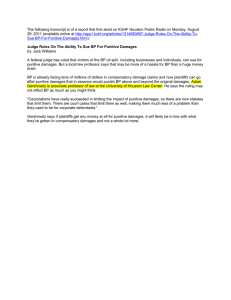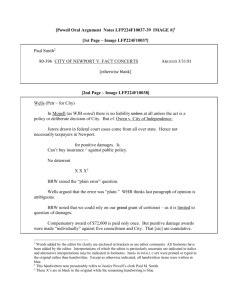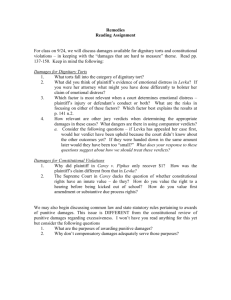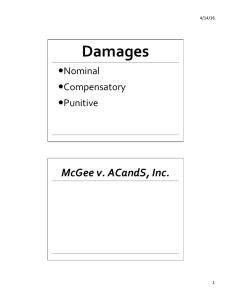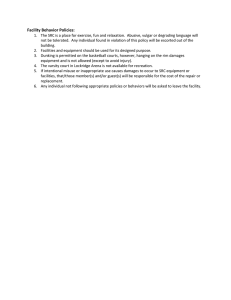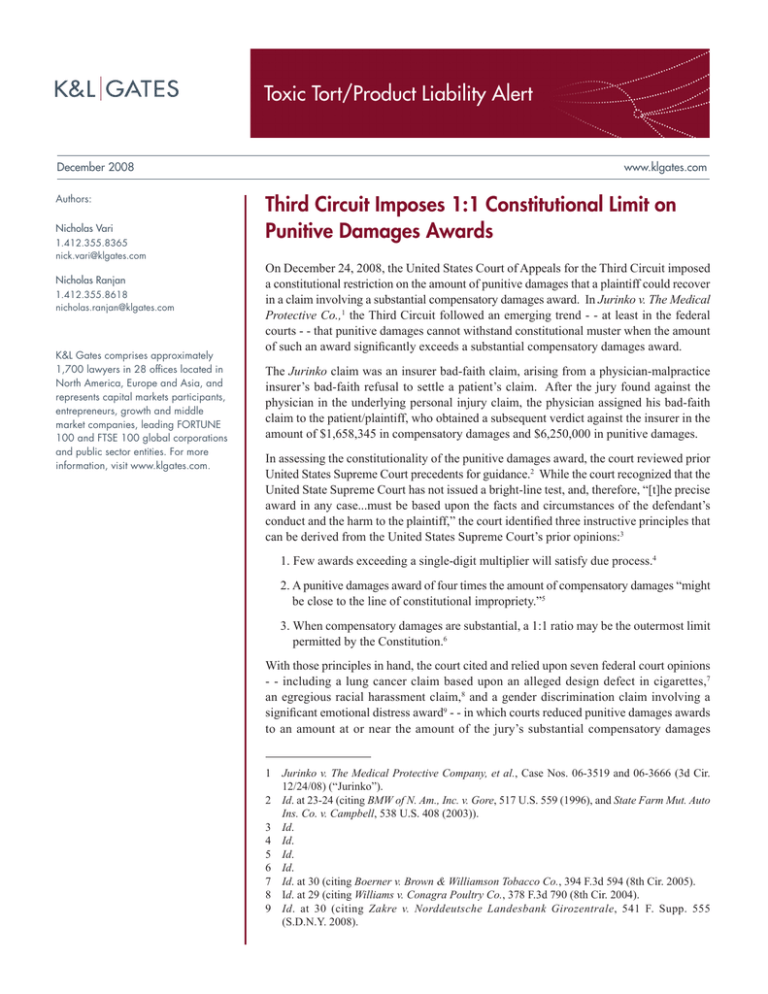
Toxic Tort/Product Liability Alert
December 2008
Authors:
Nicholas Vari
1.412.355.8365
nick.vari@klgates.com
Nicholas Ranjan
1.412.355.8618
nicholas.ranjan@klgates.com
K&L Gates comprises approximately
1,700 lawyers in 28 offices located in
North America, Europe and Asia, and
represents capital markets participants,
entrepreneurs, growth and middle
market companies, leading FORTUNE
100 and FTSE 100 global corporations
and public sector entities. For more
information, visit www.klgates.com.
www.klgates.com
Third Circuit Imposes 1:1 Constitutional Limit on
Punitive Damages Awards
On December 24, 2008, the United States Court of Appeals for the Third Circuit imposed
a constitutional restriction on the amount of punitive damages that a plaintiff could recover
in a claim involving a substantial compensatory damages award. In Jurinko v. The Medical
Protective Co.,1 the Third Circuit followed an emerging trend - - at least in the federal
courts - - that punitive damages cannot withstand constitutional muster when the amount
of such an award significantly exceeds a substantial compensatory damages award.
The Jurinko claim was an insurer bad-faith claim, arising from a physician-malpractice
insurer’s bad-faith refusal to settle a patient’s claim. After the jury found against the
physician in the underlying personal injury claim, the physician assigned his bad-faith
claim to the patient/plaintiff, who obtained a subsequent verdict against the insurer in the
amount of $1,658,345 in compensatory damages and $6,250,000 in punitive damages.
In assessing the constitutionality of the punitive damages award, the court reviewed prior
United States Supreme Court precedents for guidance.2 While the court recognized that the
United State Supreme Court has not issued a bright-line test, and, therefore, “[t]he precise
award in any case...must be based upon the facts and circumstances of the defendant’s
conduct and the harm to the plaintiff,” the court identified three instructive principles that
can be derived from the United States Supreme Court’s prior opinions:3
1. Few awards exceeding a single-digit multiplier will satisfy due process.4
2. A punitive damages award of four times the amount of compensatory damages “might
be close to the line of constitutional impropriety.”5
3. When compensatory damages are substantial, a 1:1 ratio may be the outermost limit
permitted by the Constitution.6
With those principles in hand, the court cited and relied upon seven federal court opinions
- - including a lung cancer claim based upon an alleged design defect in cigarettes,7
an egregious racial harassment claim,8 and a gender discrimination claim involving a
significant emotional distress award9 - - in which courts reduced punitive damages awards
to an amount at or near the amount of the jury’s substantial compensatory damages
1 Jurinko v. The Medical Protective Company, et al., Case Nos. 06-3519 and 06-3666 (3d Cir.
12/24/08) (“Jurinko”).
2 Id. at 23-24 (citing BMW of N. Am., Inc. v. Gore, 517 U.S. 559 (1996), and State Farm Mut. Auto
Ins. Co. v. Campbell, 538 U.S. 408 (2003)).
3 Id.
4 Id.
5 Id.
6 Id.
7 Id. at 30 (citing Boerner v. Brown & Williamson Tobacco Co., 394 F.3d 594 (8th Cir. 2005).
8 Id. at 29 (citing Williams v. Conagra Poultry Co., 378 F.3d 790 (8th Cir. 2004).
9 I d. at 30 (citing Zakre v. Norddeutsche Landesbank Girozentrale, 541 F. Supp. 555
(S.D.N.Y. 2008).
Toxic Tort/Product Liability Alert
award.10 In addition, the Jurinko court indicated that
the United States Supreme Court’s recent opinion in
Exxon Shipping Co. v. Baker11 - - which was decided
in the context of federal maritime law - - provides
additional support for a constitutional limitation on
punitive damages in claims involving substantial
compensatory damages.12
In sum, while it has been designated “NOT
PRECEDENTIAL,” the Jurinko opinion provides
strong support for a 1:1 constitutional limitation on
punitive damages in claims involving substantial
compensatory damages awards. In addition, the
limitation appears to extend to punitive damages
awards in all types of claims, including claims
involving significant personal injuries.
10 W
hile it did not identify precisely the amount of
compensatory damages that would be considered
“substantial”, at least one opinion cited in Jurinko
involved an award of less than $370,000. Id. at 29 (citing
Bridgeport Music, Inc. v. Justin Combs Publishing, 507
F. 3d 470 (6th Cir. 2007)).
11 128 S. Ct. 2605 (2008).
12 Jurinko, at 28, n.15.
K&L Gates comprises multiple affiliated partnerships: a limited liability partnership with the full name K&L Gates LLP qualified in Delaware and
maintaining offices throughout the U.S., in Berlin, in Beijing (K&L Gates LLP Beijing Representative Office), and in Shanghai (K&L Gates LLP Shanghai
Representative Office); a limited liability partnership (also named K&L Gates LLP) incorporated in England and maintaining our London and Paris
offices; a Taiwan general partnership (K&L Gates) which practices from our Taipei office; and a Hong Kong general partnership (K&L Gates,
Solicitors) which practices from our Hong Kong office. K&L Gates maintains appropriate registrations in the jurisdictions in which its offices are
located. A list of the partners in each entity is available for inspection at any K&L Gates office.
This publication is for informational purposes and does not contain or convey legal advice. The information herein should not be used or relied upon
in regard to any particular facts or circumstances without first consulting a lawyer.
©1996-2008 K&L Gates LLP. All Rights Reserved.
December 2008 | 2

